Wednesday night rolled around, and we were set to play In a Wicked Age. This was going to be my fourth or so time running the game, the second time for both Tim and Chris to play (revisiting the same characters) and the first time for both Meera and Randy.
Participant background
It’s not unimportant to note that I have a lot of play time with various story-games (not as much as I’d like) and that Tim and Chris have been playing quite a few different games with me in the last year or so, including Galactic, Dogs in the Vineyard, Inspectres, IAWA, and a couple others (I think). Meera’s played a couple of these types of games as well, most notably (in my head) Primetime Adventures. Randy’s played a little PTA, some Dogs, some Sorcerer, and I think that’s about it.
Significant (to me, at least) is that both Meera and Randy have a lot of play time with Amber DRPG (or some variation thereon) – enough that I think it’s fair to say that their experience with that game strongly informs and establishes their modes of play. I don’t say that to malign – I love em both, but the habits that Amber establishes are there, demonstrable, detectable even if you don’t know that’s what you’re seeing, and hard to break.
I bring that up because it mattered in play.
Now, first off, I think the game went well. We had a fun oracle to start out with, and there was a lot of stuff going on.
WHEN WE LAST LEFT OUR HEROES (read: last session)
* Farid Dafir, the marketplace snake charmer, had just reclaimed his rightful place at the head of the animal cult, ousting the woman Eil Bet.
* “Regano” al Aiqtanq, his cousin, had at least temporarily snared the heart of Kianna, the sneak-thief who’d gotten the whole mess with the released genii and the evil spirit started in the first place.Chris was left at the top of the We Owe list. He picked NEST OF VIPERS as the Oracle and selected the first one. Tim crossed himself off the We Owe list to “just be” in the story.
The Oracles elements (from which one selects a character) are:
* A band of slavers, bold and incorrigible
* A moon gazer, possessed by 10 rival spirits
* Burglary of the storehouse of a powerful robber merchant
* The warden-ghost of the place, generous to the good-willedPossible Characters, implied or implicit
* Any one of the slavers, including their leader, 2nd in command, or whoever
* Any one of the slaves, ditto
* The moon gazer, possessed
* Any one of the people burgling the storehouse
* The robber merchant, or one of his people
* The warden-ghost
From that, we came up with:
* Chris, playing his cult-leader/animal-charmer Fariq, who is also the moon-gazer with the 10 angry spirits within.
* Tim, playing Regano.
* Meera, playing Jessemyn, one of the slavers, who are all working for…
* Randy, playing Kadashman, the robber merchant and sorcerer.
The NPCs were:
* Natan, Kadashman’s eunuch major-domo, conniving to replace his master.
* Kianna, the thief from the first session, reincorporated as the burglar of the robber merchants ‘storehouse’.
* Saahi, the head of the slavers, in love with Kadashman.
* “Precious Dove”, Kadashman’s prime concubine, his conduit to the spirits he controls through sorcery, the one person who can put Fariq’s spirits at peace, the person Kianna was sent in to “borrow” (kidnap) by Fariq.
Much wackiness ensued. In the end, Fariq had his spirits sorted out, the concubines had all fled, Regaro had kept Kianna safe from the eunuch (who was rolled up in a large rug), and Saahi and Jessemyn were riding out into the desert with an unconscious Kadashman draped over the saddle. It was a pretty good session.
But there were still a few disconnects and weirdness. I, for one, automatically went into post-conflict narration once something wrapped up, and (a) that’s not always my job and (b) the results of the conflict hadn’t been negotiated yet, so I was totally going cart before the horse.
That wasn’t all of it, though. There were a few points in the game when what was going on at the table was sort of churning the water without doing anything, and a few points where the action ground to a halt when I’d turn to a player, ask what they were doing, and get a kind of deer in the headlights look. Analysis Paralysis, Tim calls it, and mmmmmmaybe that’s right. I’m not sure, though.
I am sure (pretty sure) what was causing it though.
Over on his blog, Vincent has been talking about different resolution systems. Specifically, talking about the ways in which the different games’ fictional stuff affects their system stuff, and vice versa.
The cloud means the game’s fictional stuff; the cubes mean its real-world stuff. If you can point to it on the table, pick it up and hand it to someone, erase it from a character sheet, it goes in the cubes. If you can’t, if it exists only in your imagination and conversation, it goes in the cloud.
Bear with me, guys, I’m going somewhere with this.
His first example is your basic DnD-type game.
Resolution system #1 is for an imaginary game that’s just like any game you might have played in 1990:
1
“I take position on the crest of the hill.”
“Okay.”
“When he comes close, I attack him!”
Translation: In #1, the only thing happening is story-stuff, and all it does is inform other story-stuff.
2
When your character attacks mine, roll dice.3
…And if your character has the high ground, add 2 to your roll.
#3 is a big one for certain kinds of players (I’m one of them): with some use of the fictional game elements (terrain, cover, high ground, et cetera), you garner bonuses that give you an edge in the system. THIS PART IS IMPORTANT TO MY EVENTUAL POINT. REMEMBER IT.
Now I’m going to try to give an example of Amber DRPG
1 



“I take position on the crest of the hill… with a gun ready… the King’s sword… my armor on… and all prepped up.”
“Okay.”
“When he comes close, I attack him!”
In a typical game, the only thing happening there is story-stuff, and all it does is inform other story-stuff. In ADRPG, however, it’s also feeding into the “system” (read: the GM’s head).
2 
When your character attacks mine, the System comes into play to determine result. It looks like this…
3 
GM says: “Well, the guy you attacked has a higher Warfare than you, so he wins.”
Then you say…
4a. 
“Well, I had high ground…” And the GM says “Okay…”
4b. 
“And I was ready for him…” And the GM says “Okay…”
4c. 
“And I have the King’s sword…” And the GM says “Okay…”
4d. 
“And I’m wearing armor…” And the GM says “Okay…”
4e. 
“And I have a gun…” And the GM says “Okay…”
5. 
GM says: “Well, with all that prep work, even though the guy you attacked has a higher Warfare than you, he loses.”
See, ADRPG has a system. The system is “Convince the GM you should win.” ((NOTE: In many traditional games – say Basic DnD and AD&D1 and 2, this System is also how Anything-Not-Combat is handled.) The only way to use that System successfully is to use preparation and situational advantages to garner strong arguments in favor of “you win.” In these diagrams, that preparation all looks like right-facing arrows: stuff happening in the story that affects the results of the System.
Statistically, if you don’t do that in ADRPG, you will probably lose.
IN FACT: In ADRPG, jumping into a conflict off the cuff, spur of the moment, usually means you fail, for two reasons:
1. You didn’t prepare enough to put things clearly toward your advantage.
2. The GM wasn’t ready for it, and human beings tend to say “no” when they’re surprised by stuff. Sugar coat it however you like, but that’s human nature.
Let me take that assertion one more step: Play enough ADRPG, and you’ll begin to believe that this is how you handle conflicts in any game. (This is not ADRPG’s fault – that kind of habitualization-to-the-system-you-play-a-lot will happen with any game, if you play it enough.)
Now, I will let Vincent explain the resolution system for In A Wicked Age:
1 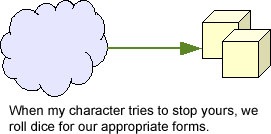
2 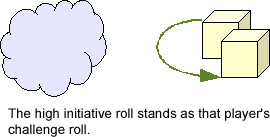
3 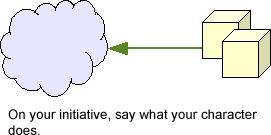
4 
5 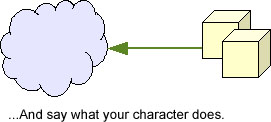
6 
7 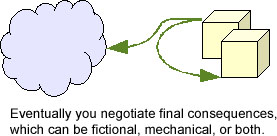
What’s absent in the IAWA diagrams?
Rightward-pointing arrows.
The things that are critically important to success in ADRPG have no bearing on the IAWA system a’tall. They have plenty bearing on the GAME, but it looks like this:

“That’s nice, Doyce, but where are you going with this?”
I saw two big, jarring things happening in the game last night, mostly with the ADRPG-experienced players, and I think this sort of explains why.
Thing #1: Lots of Churning Activity in the Cloud, with the Expectation it would Affect the System
The basic gist of this is that there is no allowance in IAWA for “I’m up on a table, for a height advantage that gives me a +2.”
You can achieve a similar type of effect by using the We Owe list to “commoditize” your situational advantage, buy that bonus, and color it appropriately (as one does with Aspects and Fate Points in Spirit of the Century), but that’s not the same thing: that’s the rules affecting the rules, with a sideswipe at the ‘story’ to color it.
So there’s a bit of a disconnect there, because if you’re Randy, you’re immediately laying out Amber-style groundwork as soon as you start play.
“Do I have connections to the Mayor?” “What are the defenses in my house?” “How many spirits can I control?’
And in IAWA, the answer to those questions is:
“Yes, if you take that connection as a Particular Strength.” “Your defense amount to the strength of your die rolls in a conflict in which someone is sneaking in.” and “‘How many spirits’ = ‘however many you need to reflect what your dice say you accomplished’.”
Thing #2: “But… I can’t kill him, I haven’t prepared.”
I saw this almost every time I went to Randy or Meera with a ‘what are you doing now’, and I’m damned sorry about it, because I didn’t figure out what was going on until today, so I couldn’t help. The problem was, first, that there was a kind of deer-in-the-headlights thing going on, and when an action was determined, it was almost always prep, such as:
- “I go talk to guy X, to see if we should work together” or
- “I send X to investigate Y.”
…or something like that.
The deer-in-headlights thing, I see as this: IAWA has players set up Best Interests during character generation. In a nutshell, this is where you pick other characters in the game and say “I want X from them”, and it can (and should) be things like “I want to sleep with X” or “I want X to love me” or “I want X exiled, maimed, shamed, or dead.” Stuff like that.
Why? Because IAWA is meant to simulate the genre of Sword and Sorcery fiction of Robert Howard and Tanith Lee. It’s about action, reaction, brief thought, briefer planning, and MORE ACTION. The game rewards jumping in and ACTING, being fluid, and letting your original character concept change and be mutable and defined as you go.
Amber, by contrast, (and here, I’m talking about the fiction the game is based on) is about subterfuge, planning, spying, more planning, preparation, more spying, more preparation, and finally ACTION. Also, significantly, your characters are supposed to be Largely Immutable Archetypes that Do Not Appreciably Change as a Result of Events. I should point out here that the ADRPG encourages that kind of story admirably, but lots of play in that system trains you to habits that run entirely counter to IAWA’s source material.
So: Deer-in-Headlights: It’s your turn to act, and you have several Best Interests you can jump in and start ACTING with, but all those things are VERY DIRECT, the system doesn’t mechanically reward preparation, and you’ve been taught by years of ADRPG that going in without prep means You Fail. The whole situation is impossible.
Damn. I’d freeze up too.
During the game, I got Randy into direct, immediate conflict by basically attacking HIM, and Meera went after someone she wanted to kill only after being left alone with him for the second time, while he was unarmed, with his back to her, giving her totally evil orders… and even then she was really… well, uncomfortable about it. She hadn’t prepared.
I didn’t see this then. I see it now. It’s fascinating.
I prescribe a lot more gaming to break this habit during games when that habit is not valuable.
Now, I had a lot more to say about this, and I wanted to give it a final pass to make sure that everything was all shiny and full of flowers and roses and couldn’t be taken as an attack on anyone, but I got interrupted a lot today, and I have to go, like, NOW, so…
- I love all you people.
- There’s nothing wrong with ADRPG, if that’s what you’re playing – it does what it means to do pretty well.
- IAWA isn’t a perfect system either – it does what it means to do pretty well.
- I’m simply observing behavior and learning what I can from it to be a better co-player.
- All typos and such in this post are entirely… um… Chris’ fault. Yeah. Totally.
Let conversation ensue within the comments.
The funny part is that I was going to apologize a little for doing too much “shading into the GM role” of analysis. [I also need to speak up more and not just suggest connections sotto voce…] At least part of my hesitation was character – I didn’t have a good grasp of her role, which is why, “When in doubt, Violence!” was my battle cry. But yes, actually one of my goals for playing is to learn how to do exactly that:
play.
[laugh] I’m slowly doing this – InSpectres is just another example. When given leeway, I will go. I’m not very good at it, yet, because I’m constantly looking for signals (and this is from the “feed the GM, GM rewards you for being fed”* style of playing you learn in traditional RP, such as [*cough*] Amber) of, “When do I stop? When have I gone too far in asserting my role?”
Here’s a point right here – my immediate “learned” answer was going to be, “When you’ve accomplished what your character wants to accomplish,” and I think that’s not all of it.
I’ll be honest: some of it is the same problem I have in writing, and I will cheerfully blame ADRPG for some of the points you noted. I’m great at evocative, at doing the kind of “hedge around the situation” writing, but I completely have no ability to do the “punch” where there’s payoff for all the build-up.
But I did slap the slave girl. That amused me.
(*) This is a laboratory mice thing, too. But I think of the first part with horses, of all creatures. A horse you’ve trained to respond to commands being let out into the pasture alone can be a funny, scared thing. “Um. First I’m going to look around a lot. Then I’m going to run. Whee! I’m running. When do I stop? Eek!” So I’m used to being the lab rat, and Story Games is turning me into a wild horse? I think I want to stop the metaphor right about now…
God, Meera, you make some great points.
And YES, you DID slap the slave girl! Why had I forgotten that?
You know what, I think the scene where you slapped the slave girl was wholly MY fault, because when you did it, everything totally ground to a halt, and it was All. My. Fault.
De will tell you, I didn’t used to be very good at situations where PCs were gunning for other PCs, and while I’m better at it now (after running things like Mountain Witch and… yes. **IAWA** (hangs head)), there are still times when I’m not ready for it when it happens.
You know how I observed that, when surprised, a GM’s gut reaction will be “no”?
Well, that move totally surprised me, and I just froze. I imagine my body language was all “No no no no”, and the energy of the moment ground to a gear-stripping halt.
And it was entirely my fault.
We *all* have stuff to learn. 🙂
Yes and no.
First off, Fekesh. Should have picked someone else. He had pretty much everything he wanted, he just wanted to keep it and More of the Same. Now that I know how the game works I see that one of the slaves would have been just chock full of terrible need and more suitable. At the very least I should have gone with something other than Covertly for the way Fekesh’s Sorcery worked. Spirits spying on everything, while sensible as a source of F’s wealth, make for passivity. Had some fun with it but not enough.
Not that the returning characters, the Road to Wiqteijapol duo, were
icons of Cimmerian action or Tanithy decadence either. (Though perfectly fun in their own ways.)
Zelazny’s Amber books are NOT “subterfuge, planning, spying, more planning, preparation, more spying, more preparation, and finally ACTION” though the game tends to go that way. The protagonist wakes up in a mental hospital with amnesia, breaks his restraints, breaks the orderly, intimidates the director into coughing up info and money. Goes straight to the home of the sister who had him committed to shake her down for info. Cons a brother into taking him home, is surprised to find that the road trip involves crossing hundreds of other worlds; by car. Beats down opposition in the way. Recovers his memory and goes directly to where his hated brother is and tries to kill him. Fails, flees to another brother. They gather armies and hatch a Devious Plan: direct attack. They lose, he gets blinded. Grows eyes back, he escapes, gathers another army and goes straight back, no spying beyond a little recon… Eventually he does try to figure out wtf is going on but that’s not his normal SOP. Other characters do spend most of their time spying and intriguing, but that’s mostly off camera. Corwin always wants to Do Something and gets frustrated when he can’t.
Heck, in two campaigns an “Amber Plan” meant “Get ’em!” (Recon, spy, plan, spy, recon, plan, Eff it! I want to kill something! Attack! Now!)
Quinn, from your Amber game, was a planner, my channeling of my inner engineer/scholar. Not my normal thing. Finnvar: romantic hero (in the Wrong Game for that), Niccolo: Renaissance prince and artist, Dolon: Renaissance prince/de Danaanan lord; Hiruma Gu: wiley Big Strong Soldier, Challenger: angsty young Mr. Incredible, Henri: Big Strong Voodoo Badass.
Anyway, now I know better and won’t make another Fekesh, though I did squeeze some fun out of him. Should have ordered Meera’s character whipped though. I’m used to having time to get more of a feel for a character and hesitated to go all-in.
You make a couple more great points, Randy. I want to home in one a few:
1. I don’t want this to turn in analysis of what the Amber setting is and isn’t. You make good examples. I could come up with a comparable list wherein people plan and prep and so forth… some of my examples would be the same scenes you mention, because we see them differently. No, I don’t think that adds much to the conversation.
Certainly, you are right, in PLAY, Amber plays more that way than the source material, and I think it’s the learned behavior from the GAME that’s significant, not the original setting. So: conceded.
2. I disagree with this:
“Fekesh. Should have picked someone else.”
Certainly, you *could* have. Certainly, someone like a slave would have come sort of pre-loaded with lots of unfulfilled desires.
However, with that said, the problem with Fekesh wasn’t Fekesh-the-robber-merchant himself, just in his “Best Interests.” Specifically, as you noted, he was pretty happy with the way things were: he liked his life, he wanted it to pretty much stay exactly as it was, and his Best Interests (and his abilities) were aimed at maintaining that.
No, I don’t think the problem was Fekesh himself, just in setting him up to be happy with things as they already were. As you pointed out, it makes him passive.
Fekesh becomes more fun to play if we had simply tweaked his Best Interests in a way that showed he WASN’T happy. That he wanted something. That he was unsatisfied.
The fact that he WASN’T set up that way? That’s not your fault.
That was MY fault.
*I* have played the game before. *I* was GMing the game, and the fact that Fakesh’s best interests are basically “I want things to stay the way they are” should have been a huge red flag to me.
Honestly? That’s not just a good rule for In a Wicked Age — it’s a pretty good rule for most any game: make up a character (or encourage your characters to make up a character) who would not be at all happy if things stay exactly the way they are, and who wants to do something about it.
In fact, Fekesh wasn’t the only character with that problem. Looking at it in hindsight, Regaro (played by Tim) had pretty much the exact same problem — he starts out the story pretty happy with the way things are, and his Best Interests are basically “Protect the Kianna”, which is just another way of saying “keep things the way they are.”
Looking even further back, I think Regaro had pretty much the same thing going on in the first session (to a lesser extent). I just didn’t notice because, in both sessions, whenever it’s Tim’s turn to act, he picked the most chaos-inducing move he could — which in turn kicked up so much dust that you can’t see the character very clearly.
So, like Meera’s post, yours pointed out something fairly straightforward and obvious that I can improve in my own play.
Thank you. This has already been a very good conversation.
One other point — the MAIN reason I mentioned Amber and compared it to IAWA is this:
In Amber, there’s a lot of activity in “The Cloud” (the story of the game) that has mechanical effect on the results you will get from The System. For example: getting better gear, allies, high ground, poison… whatever… all that gives you mechanical advantage.
In IAWA, the activity in “the Cloud” has NO mechanical influence on the results of the system.
I drew the comparison because I was seeing people do “cloud prep” – I think – out of habit, and was suddenly struck that it would have no effect in IAWA.
Now, in IAWA, you can do something mechanical to give you advantage (use the We Owe list), color it with story elements (call it “a magic sword I grabbed”), and it affects the System, but that’s not the same thing. Same thing’s essentially true of Spirit of the Century and many other story-games.
That’s really the main reason I drew that comparison.
One more note.
NOW, after everything that’s happened? I think Fekesh would come with more fun stuff built in.
Now…
… he is NOT happy with the way things are.
… he definitely wants things.
… he would be much more proactive about getting them. 🙂
Just a random thought.
Cool.
Giving it more thought, Fekesh would have been a better character if I’d kept with a d12 Violence instead of Covert and thought Rage instead of Sneaky. Set out to kill Kianna and her little dog Regaro immediately instead of thinking of ways to use them. Pay attention to the relationship chart and threaten as many interests as possible.
To be sure, rocking the Best Interests is the way to make the game work, for sure.
Don’t discount acting Covertly out of hand, though — it doesn’t matter HOW you’re acting in the game, so long as your ACTING, you know?
Put another way, it wasn’t a strong “Covertly” form that made Fekesh passive; it was simply that his desires were passive. Lots of sneaky people can be very aggressive in going after what they want.
Personally, I think Fekesh is a good character – he just needed to ‘want’ something.
“This man can bless items with power? That sort of magic is traditionally believed to be contained in a man’s spleen… let’s find out.”
🙂
So…while I’ll agree that my interests were static on the chart, I stacked Kianna’s interests so that they wouldn’t be, knowing also that Farid’s interests were also way non-static.
So, yes, Regano’s BI is ‘protect Kianna’, but the the subtext is ‘keep Kianna for myself’, and ‘not go insane from my insight into the spirit world’, and the one I painted in the opening scene ‘Get out of my life of half-gift squalor’.
Regano is always looking to keep Kianna penned up for himself, knowing all the while of her wild nature.
So, basically, my BIs depended on something going awry with Farid and Kianna, which we set in motion *in the Oracles*, so I knew I didn’t need to ‘spice’ things any more.
My preference is always to set in motion challenges to my BIs with the other PCs before we even really start play – so we know what at least some of the conflicts are right away.
And, I’m not against a little metagaming out of the gate to adjust all that so that everyone is being challenged….people just have to jump in and look for something that would be directly a *problem* for their character, not just a goal…
And to Randy’s point about waiting for things to unfurl – in our Wednesday games, we only get 2-3 hours, so you have to jump in with both feet right away. 😀
“we only get 2-3 hours, so you have to jump in with both feet right away.”
Yep.
Ok, I’ve played and GMed a LOT of ADRPG, and I count it among my favorites due to the strength of the story building. That said, I’m very aware of the system’s limitations.
I agree that the ‘in the cloud’ vs the ‘in the cube’ dichotomy is probably at the heart of your disconnect, but I’d look less at the systems that your players lean towards, and more towards the need to set up a table-wide shared understanding of how the system and adventures are going to run. The perennial canard of a Game Covenant raises its musty skull from the depths of its hoary crypt.
I don’t think a formal covenant is necessary, but a discussion of how the game will proceed, what the players want from the experieince and how the GM plans to run it would be beneficial when moving into a system that’s significantly different from past games. And IAWA sounds significantly different. (Never heard of it, and now I want to try it!)